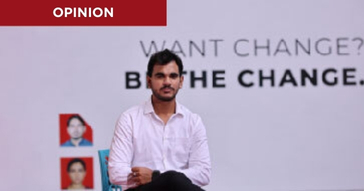STUDENT OPINION
GIVING WINGS TO MY DREAMS

Akshat Joshi- Student, Kautilya
Published on :
Working as a software engineer in a renowned multinational consultancy, visualizing myself addressing a hall of people representing the global fraternity was merely wishful thinking. That was when I made a life-changing decision to pursue a Master’s in Public Policy, a decision I knew would bring me closer to where I had visualized myself. Since then, every day has been a step closer in my yearning, to make an impact and improve the life of my community and the world.
I recently represented India at the Model United Nations conference in Istanbul, Turkey, as a member of the UNHCR committee. Like all other firsts, this will be etched in my memory, as my vision became a reality.
My excitement was accompanied by nervousness and anxiety as I sat there amongst educationists, lawyers, and presidents of youth parliaments, representing a nation of 1.38 billion. I arrived in Istanbul a day before the conference and had a sleepless night. The next day I went for a run to calm my nerves before the big event.
The day started with opening remarks on the situation of refugees in our countries, for which we were allowed 2 mins each. I started my speech by enlightening upon the diversity and rich history of India in welcoming refugees across the globe. “Perfect timing India, you finished in 2 minutes,” were the words from the chair after I finished my speech.
The conference had a provision of a moderated and unmoderated caucus. A caucus is typically proposed to pass a motion or resolution. In a moderated caucus the Chair may allow each delegation to speak for one minute on the proposed topic. In contrast, there is also an unmoderated caucus on the sidelines, which allows the delegates to informally meet for 20 minutes while the conference is adjourned. Each country has a right to propose a moderated or unmoderated caucus for a 20-30 minute duration.
As per the 1951 refugee convention, a refugee is “someone unable or unwilling to return to their country of origin owing to a well-founded fear of being persecuted for reasons of race, religion, nationality, membership of a particular social group, or political opinion”. As India’s delegate, I proposed the first moderated caucus which asked the international community to add economic aspects to the ‘Refugee’ definition. However, with my proposal not being passed at the moderated caucus, I felt disappointed but managed to pull myself together.
All delegations were asked to draft a resolution for the refugee crisis focusing on education and healthcare during the COVID pandemic. There were finally two drafts sponsored and signed by different countries. India worked with Qatar, Trinidad and Tobago, Jamaica, Sweden, Ecuador, Gambia, Algeria, and Pakistan. A draft was passed if it had a 2/3 majority of all the countries. I started interacting with Afghanistan, Kenya, and Ethiopia, which had a good relationship with India and had always supported us on international forums as the voting was scheduled for the next day.
The voting was preceded by debates, questions, and queries. India pinned five main points in the draft resolution-
- 100 Days Employment Guarantee for Refugees to make them economically sustainable.
- Community clinic for refugees, especially for Covid vaccination.
- Skill Refugee program to push refugees from informal to the formal sector.
- Health Insurance for refugees.
- Reservation for refugees in educational institutes.
Interacting with people from different nations allowed me to understand global perspectives about India. Africans see India as a medical destination where people get affordable and good health facilities. Our pharma industry is praised by one and all. Indian doctors are spread across the globe and have a good prestige. Indian educationists are also world-renowned. Many people across the globe travel to India to pursue their higher education. Almost every foreigner I met knew about Bollywood. Nations like Afghanistan see Indians as good friends as India has invested heavily in education and medical facilities there. India- Pakistan relations were at their best on the diplomatic level as we worked together to pass our draft.
On the voting day, India and other draft resolution members gave final speeches before we could vote. India’s resolution got passed along with the paired countries.
I felt humbled and grateful at the end of it all as the whole experience was overwhelming. All the hard work, negotiations, and discussions had paid off. INDIA WINS. This is one of the greatest moments of my life where all my dreams seemed to be true. I see this experience as a stepping stone to build my career.
I look forward to representing India on the global stage again.
*The Kautilya School of Public Policy (KSPP) takes no institutional positions. The views and opinions expressed in this article are solely those of the author(s) and do not reflect the views or positions of KSPP.
Rudraram, Patancheru Mandal
Hyderabad, Telangana 502329
